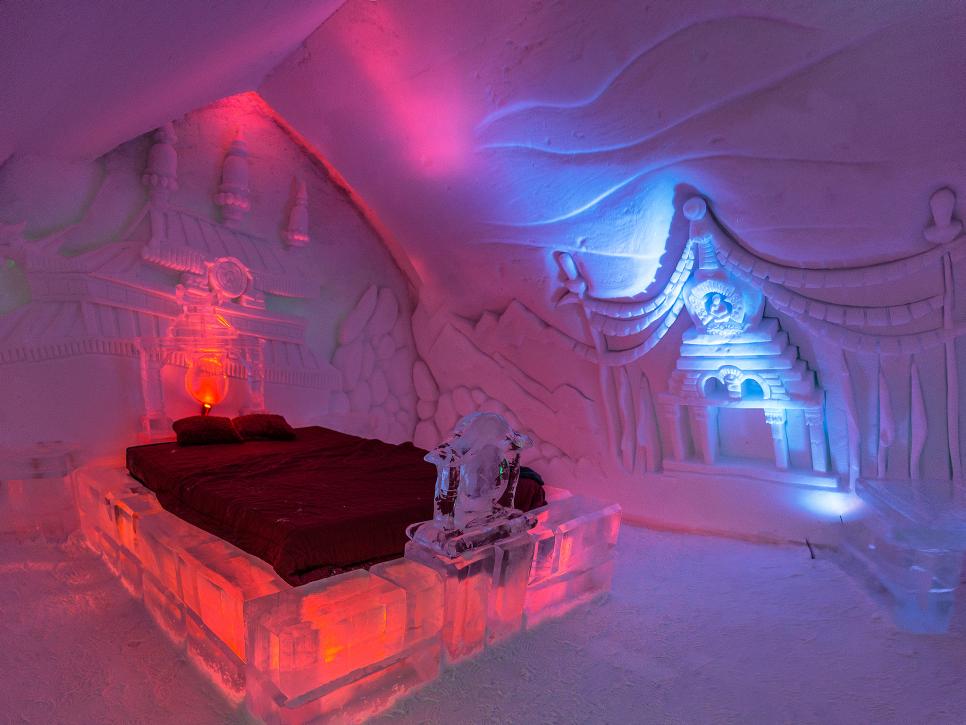A few years ago, my husband and I attended a winter festival in Quebec City and stayed in the famous Ice Hotel, “Hotel de Glace.” When we read about this unusual lodging in French Canada, I was mesmerized by the idea of a structure, including all the furniture inside, made completely out of ice. Since there were no pipes inside, bathrooms and showers were located in a regular building across the street. There were no hinges for the doors, so curtains separated each room from the hallway. Wires were inserted inside translucent ice blocks, and each wall was illuminated by a mysterious and magnificent light. Each room had its own theme with detailed carvings on the walls portraying a culture or a narrative. The beds were covered with animal skins, and each guest was provided with an insulated sleeping bag designed especially for sub-zero temperatures.
But of all the impressive features of this hotel, what awed me the most is that each spring, the structure melts away and is rebuilt by craftsmen in the early winter. I was equally surprised that the “loss” of this grand hotel was accepted by everyone involved in its construction without any sadness or disappointment. Each year, artists were willing to toil for months, rebuilding this creation without feeling discouraged that they were, yet again, constructing a temporary structure.
This type of commitment to the task made an impact on my understanding of life.
As I wrote about my journey here, I was born in the former Soviet Union, and my family immigrated to the United States when I was 12 years old. As an adolescent, I felt lost trying to rebuild my life in a new country. I yearned for familiarity and consistency, and I was terrified of any change.
While lying inside my insulated sleeping bag in the Ice Hotel, I marveled at the magnificent and unusual surroundings. I imagined the entire glamorous structure melting away in the spring. Was I the only one feeling sad when thinking of the sunny days ahead? Was change welcomed by other visitors of these cold rooms?
The next day, my husband and I decided to visit the local Chabad House, “La Maison Chabad,” run by Rabbi Dovid and Devorah Leah Lewin.
Still reflecting on the night at the Ice Hotel, we were struck by the “permanence” this Chabad House represented. I was intensely aware of the brick walls, durable furniture, bookshelves with ancient texts and a picture of the Rebbe, which represented the philosophy of love and inclusion for everyone who walked through these doors. There was something so soothing about the experience of sitting at the table with the Lewins and sharing the wisdom of each other’s journey while drinking hot tea.
Rabbi Dovid grew up in France. After completing his rabbinical training, he worked as a rabbi in Nice. Devorah Leah grew up in Montreal and later moved to New York, where she taught preschool. This is where the couple met while Dovid was on a trip to New York to visit the Ohel, the resting place of the Lubavitcher Rebbe in Queens, N.Y. When I asked about the couple’s journey, Devorah Leah told us, “When Dovid and I met, we were both educators hoping to share our love for Judaism. Together, we went back to Nice and worked as youth directors. After five years of struggling with infertility, my husband and I decided to take on the challenge of becoming shluchim, emissaries of the Rebbe, and we relocated to Quebec City. Miraculously, soon after, we were blessed with our first son.
“Being the only religious family in the city means that we have a constant responsibility to be a living example of what it means to be a Jew. We take care of our little, but very vibrant, Jewish community that is scattered throughout the city. We also serve the students at the local university, as part of Chabad on Campus. We organize dinners and classes for students, creating a home away from home. With the help of Mikvah USA, we just finished building our first mikvah. And we are privileged to meet and serve the many wonderful people who visit Quebec City.”
I often think back to that sleepless night when I realized that perhaps all “structures” in my world are temporary. I suddenly understood that change is the most consistent thing in our lives. When the Jews left Egypt, they wandered in the desert for 40 years—making a total of 42 stops until they reached the Land of Israel. These stops were necessary to transition from slavery to freedom. Accepting impermanence allows us to focus on what is truly lasting: our values and mission in the world.
As Devorah Leah profoundly pointed out, “Yes, the Ice Hotel takes months and months for the craftsmen to design and build. This building and its fascinating artwork eventually melt away. Our home—the Chabad House for the Jewish people—is a permanent structure because of its mission. We are committed to bringing light and empowerment to the Jewish nation. This commitment creates an eternal legacy that doesn’t ‘melt away’ because it creates a permanent light.”
When I experience an inner resistance to change, I celebrate a “season” of life that permits the building of a new, magnificent castle. When inevitably a new “season” arrives, I mentally embrace the impermanence of our world, allowing for the “castle” to melt away. This realization of forever-changing reality makes room for opportunities to be created anew, over and over again.
I am finally liberated from my fear of transition and look forward to the change tomorrow will bring. Because I know that while most things in the world are temporary, the wisdom of Torah and performing its mitzvot is truly eternal and the most consistent thing in our lives.
What I Learned After a Night at Quebec’s Ice Hotel – Life Lessons (chabad.org)

